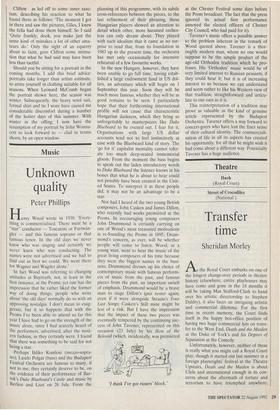Music
Unknown quality
Peter Phillips
Henry Wood wrote in 1938: 'Every- thing is commercialised. There must be a "star" conductor — Toscanini or Furtwan- gler — and this famous soprano or that famous tenor. In the old days we never knew who was singing and certainly we never knew who was conducting. The names were not advertised and we had to find out as best we could. We went there for Wagner and Wagner alone.'
In fact Wood was referring to changing attitudes at Bayreuth, not, at least in the first instance, at the Proms; yet one has the nnpressicin that he rather liked the former way of doing things, people who write about 'the old days' normally do so with an approving nostalgia. 1 don't mean to exag- gerate, but it so happens that with the Proms I've been able to attend so far this year I have had to go on the strength of the music alone, since I had scarcely heard of the performers, advertised, after the mod- ern fashion, as they certainly were. I found that there was something to be said for not being a star.
Perhaps Ildiko Komlosi (mezzo-sopra- no), Laszlo Polgar (bass) and the Budapest Festival Orchestra are famous to many, if not to me; they certainly deserve to be, on the evidence of their performance of Bar- tok's Duke Bluebeard's Castle and music by Berlioz and Liszt on 28 July. From the
planning of this programme, with its subtle cross-references between the pieces, to the last refinement of their phrasing, these Hungarian players showed an attention to detail which other, more harassed orches- tras can only dream about. They played with such idealism that it came as no sur- prise to read that, from its foundation in 1983 up to the present time, the orchestra has met only occasionally for intensive rehearsal of a few favourite works.
In the new Hungary, however, they have been unable to go full time, having estab- lished a large endowment fund in US dol- lars, an adventure which will begin on 1 September this year. Soon they will be much more famous, whether they will be as good remains to be seen. I particularly hope that their forthcoming international profile will not cause that characteristic Hungarian darkness, which they bring so unforgettably to masterpieces like Duke Bluebeard to be evened out. I fear for it. Organisations with large US dollar accounts tend not to feel instinctively at ease with the Bluebeard kind of story. The `go for it' capitalist mentality cannot toler- ate too much deep-seated immemorial gloom. From the moment the bass begins to speak out the laden introductory words to Duke Bluebeard the listener knows in his bones that what he is about to hear could not possibly have been created in the Unit- ed States. To interpret it as these people did, it may not be an advantage to be a star.
Nor had I heard of the two young British composers, John Casken and James Dillon, who recently had works premiered at the Proms. In encouraging young composers John Drummond is certainly carrying on one of Wood's most treasured motivations in re-founding the Proms in 1895; Drum- mond's concern, as ever, will be whether people will come to listen. Wood, as a young man, went to hear the music of the great living composers of his time because they were the biggest names in the busi- ness; Drummond dresses up his choice of contemporary music with famous perform- ers of music from the past, and famous pieces from the past, an important switch of emphasis. Drummond would be a brave man to stage Dillon's ignis nosier again, even if it were alongside Strauss's Four Last Songs; Casken's Still mine might be less of a risk. But I have the impression that the impact of these two pieces was eventually tempered by the continuing suc- cess of John Tavener, represented on this occasion (23 July) by his Ikon of the Beloved (which, incidentally, was premiered
'I think I've got rioters' block.'
at the Chester Festival some days before the Prom broadcast. The fact that the press ignored its actual first performance annoyed the elected officers of Chester City Council, who had paid for it).
Tavener's music offers a possible answer to the problem inherent in the remark of Wood quoted above. Tavener is a thor- oughly modern man, whom no one would suppose to be the simple product of the age-old Orthodox tradition which he pro- fesses. His 'Orthodox' music would be of very limited interest to Russian peasants, if they could hear it; but it is of increasing interest to us because we can understand and seem rather to like his Western view of that tradition, straightforward and articu- late to our ears as it is.
This reinterpretation of a tradition may prove as valuable as the kind of genuine article represented by the Budapest Orchestra. Tavener offers a way forward to concert-goers who have lost the finer sense of their cultural identity. The commerciali- sation of life in all its aspects has created his opportunity, for all that he might wish it had come about a different way. Potentially Tavener has a huge audience.










































 Previous page
Previous page